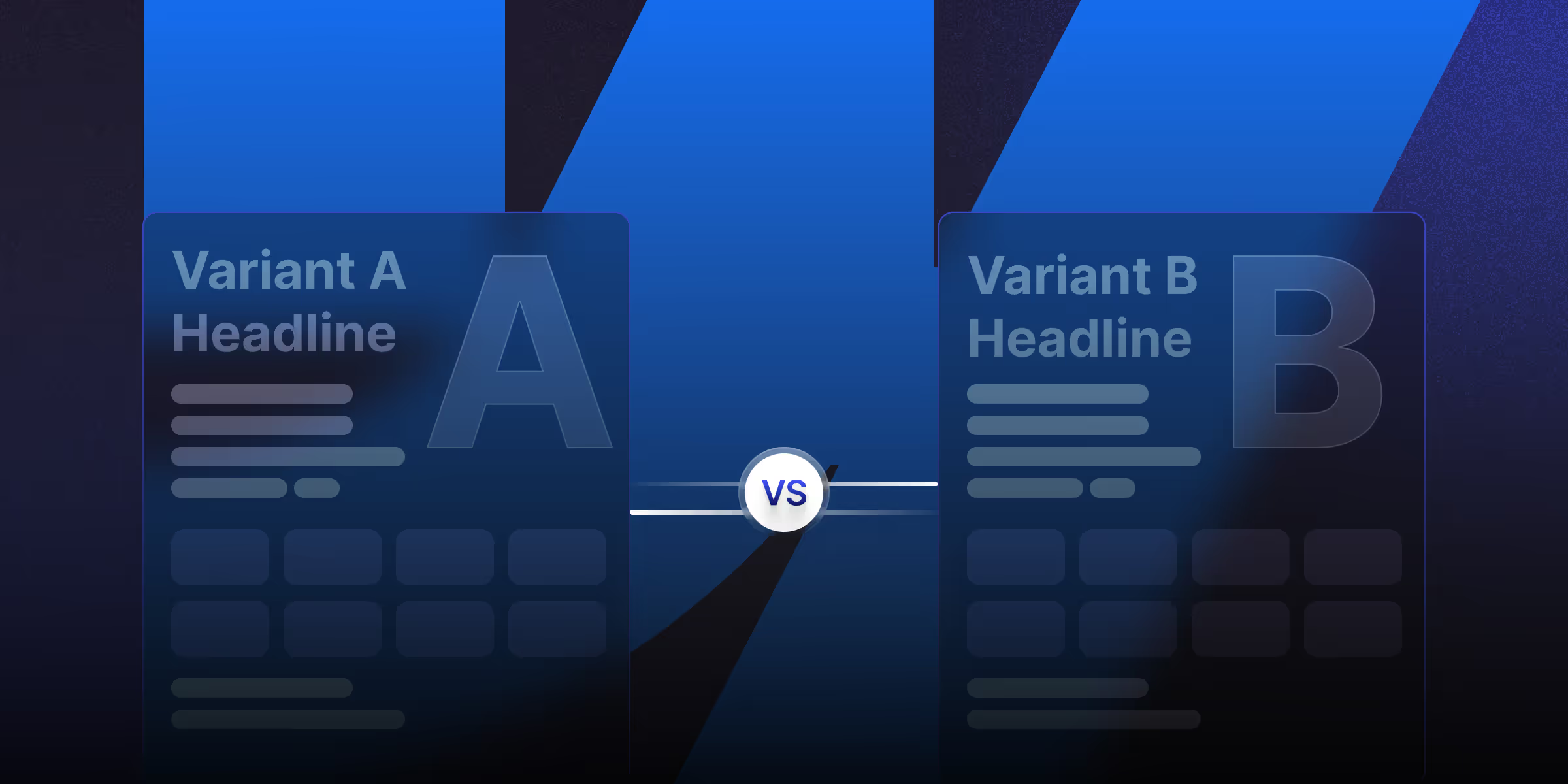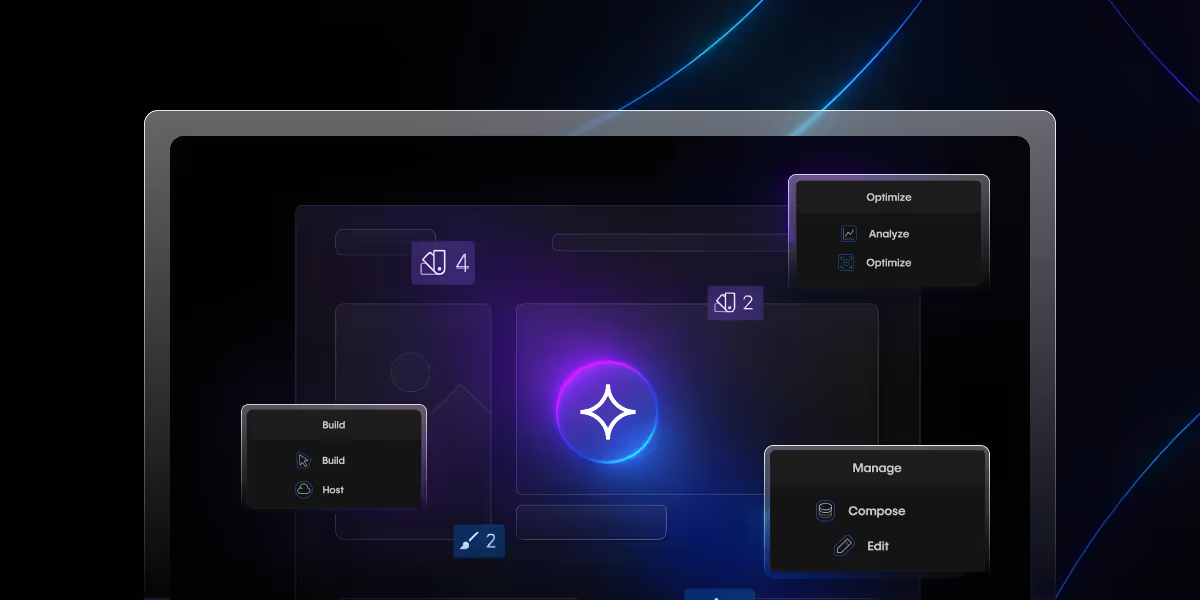Webflow A/B Testing: How to Run Split Tests to Improve Conversions
Learn what is CMS Webflow and master webflow cms development. Find webflow cms features to build scalable, dynamic websites without coding.

Actionable insights to improve SEO, speed, and conversions

Choosing the right Webflow agency can make or break your website project. With over 200,000+ Webflow sites launched last year and the market growing by 30% annually, more agencies are entering the space, but not all are created equal.
Studies show that 50% of businesses who didn't ask the right questions upfront ended up switching agencies mid-project, costing them an average of $5,000 in lost time and resources.
The difference between a successful Webflow project and a costly mistake often comes down to asking the right questions before you sign any contract. Whether you're launching your first website or redesigning an existing one, these five crucial questions will help you identify the perfect Webflow agency partner and avoid expensive pitfalls.
By the end of this guide, you'll have a clear framework for evaluating potential agencies and the confidence to make an informed decision that drives real results for your business.
Let's dive into the questions that separate professional Webflow agencies from the rest.
When evaluating a Webflow agency, their experience level is the foundation of everything else. This isn't just about how long they've been in business, it's about their specific expertise with the Webflow platform and their track record of successful project delivery.
- Platform Expertise: Look for agencies with official Webflow Partner status. Only some of Webflow developers worldwide achieve Premium Partner status, which requires demonstrating exceptional client satisfaction and technical expertise. theCSS Agency earned this recognition in August 2023 verified experts.
- Project Volume and Diversity: Ask for specific numbers. How many Webflow sites have they built? What industries have they worked in? A seasoned agency should have completed 50+ projects across various sectors. theCSS Agency, for example, has delivered 200+ websites for fast-growing companies worldwide, from SaaS startups to enterprise organizations.
- Recent Work: Webflow evolves rapidly with new features and capabilities. Ensure the agency has recent experience (within the last 12 months) and can show you current projects. Agencies stuck using outdated methods may not leverage the platform's full potential.
Portfolio Examples: If an agency can't show you specific Webflow projects or only displays generic website screenshots, that's a major red flag. Every professional agency should have a detailed portfolio with live site links.
Recent Platform Switch: Be cautious of agencies that recently switched to Webflow from other platforms. While everyone starts somewhere, you want an agency that has mastered Webflow's unique capabilities and limitations.
Social proof is everything in the digital agency world. Real client testimonials and detailed case studies reveal how an agency performs under pressure, handles challenges, and delivers measurable results. This question separates agencies that talk a good game from those that consistently deliver.
Specific Metrics: Look for case studies that include concrete numbers of traffic increases, conversion improvements, page speed enhancements, or revenue growth. Generic statements like "improved user experience" don't tell you much about real-world impact.
Challenge-Solution-Result Format: The best case studies clearly outline the client's original challenge, the agency's solution approach, and the measurable results achieved. This shows problem-solving ability and strategic thinking.
Diverse Industry Examples: A strong agency should have success stories across different industries and project types. This demonstrates adaptability and broad expertise rather than narrow specialization.
Authentic Feedback: Real testimonials often include specific details about the working relationship, communication quality, and project outcomes. Generic praise like "great work" or "professional team" might indicate fabricated reviews.
Recent Reviews: Focus on testimonials from the past 12-18 months. The agency may have been great three years ago, but what about their current performance and team?
Third-Party Platforms: Check reviews on Google, Clutch, or industry platforms where clients can provide honest feedback. These carry more weight than testimonials on the agency's own website.
No Case Studies Available: If an agency can't share detailed case studies, they either lack significant results or aren't organized enough to document their successes, both concerning for your project.
Unwillingness to Provide References: Professional agencies are proud of their client relationships and happy to connect prospects with satisfied customers. Reluctance to provide references suggests potential issues.
Only Visual Testimonials: Be skeptical of agencies that only show screenshot testimonials without names, companies, or ways to verify authenticity. Legitimate testimonials include attribution and context.
The social proof question reveals not just past performance, but the agency's confidence in their work and willingness to be held accountable for results.
Poor communication kills more Webflow projects than technical limitations ever could. A 2024 study by the Project Management Institute found that 56% of failed website projects cited communication breakdowns as the primary cause. Understanding an agency's project management approach upfront prevents costly misunderstandings later.
Structured Methodology: Professional agencies follow established frameworks like Agile or waterfall methodologies adapted for web development. They should be able to clearly explain their process from discovery to launch and beyond.
theCSS Agency, for example, uses a streamlined 5-phase process: Discovery, Design, Development, Testing, and Launch. Each phase has defined deliverables, approval points, and timelines that keep projects on track.
Dedicated Project Management: Look for agencies that assign dedicated project managers rather than having developers juggle both coding and coordination. This ensures consistent communication and prevents technical team members from getting overwhelmed with client management.
Clear Communication Channels: Professional agencies establish upfront how, when, and through which channels communication will occur. This might include weekly status calls, project management dashboards, Slack channels, or email updates.
Response Time Commitments: Professional agencies set clear expectations for response times—typically 24-48 hours for non-urgent matters and same-day for urgent issues during business hours.
Regular Progress Updates: Whether through automated dashboards, weekly reports, or scheduled calls, you should never wonder about your project's status. Good agencies proactively communicate progress and potential issues.
Transparent Problem Solving: When challenges arise (and they will), professional agencies communicate problems early along with proposed solutions rather than letting issues fester or surprise you at the last minute.
No Clear Process: If an agency can't clearly explain their project workflow or seems to "figure it out as we go," expect chaos, delays, and budget overruns.
Poor Initial Communication: How an agency communicates during the sales process is often indicative of how they'll communicate during the project. Slow responses, unclear answers, or unprofessional interactions are red flags.
No Project Management Tools: Agencies that rely solely on email or informal communication tools likely lack the structure needed for complex Webflow projects.
Unclear Revision Process: Make sure the agency clearly explains how changes and feedback will be handled, including any associated costs or timeline impacts.
Professional project management isn't just about organization; it's about creating an environment where creativity and technical expertise can flourish while keeping your business objectives front and center.
A beautiful Webflow website that nobody can find is a failed investment. Search engine optimization and technical performance should be built into every professional Webflow project, not treated as an afterthought or expensive add-on. This question reveals whether an agency understands modern web development or just focuses on pretty designs.
Technical SEO Foundation: Professional Webflow agencies understand the platform's SEO capabilities, limitations, and SEO checklist. They should implement proper heading structures, meta tags, alt text, and schema markup as standard practice, not optional extras.
Page Speed Optimization: Website speed directly impacts both SEO rankings and user experience. Look for agencies that optimize images, minimize code, and leverage Webflow's built-in performance features to achieve fast loading times.
Mobile-First Design: With mobile traffic representing 58% of all web traffic, mobile optimization isn't optional. Agencies should design and test for mobile experiences first, then enhance for desktop users.
Core Web Vitals: Google's Core Web Vitals (loading speed, interactivity, and visual stability) directly impact search rankings. Professional agencies monitor and optimize these metrics throughout Webflow development.
Content Strategy Integration: The best Webflow agencies don't just build websites. They consider how content will be managed and optimized over time. This includes CMS structure planning and content creation guidance.
Analytics Implementation: Professional agencies set up comprehensive tracking, including Google Analytics, Search Console, and conversion tracking, so you can measure success from day one.
Ongoing SEO Support: Ask whether the agency provides post-launch SEO service and support, monitoring, and optimization recommendations. One-time setup isn't enough for long-term success.
"SEO is Extra": Any agency that treats SEO as an optional add-on rather than a fundamental part of web development doesn't understand modern website requirements.
Outdated SEO Knowledge: If an agency talks about keyword density, meta keywords, or other outdated SEO tactics, they're stuck in the past and could actually hurt your search rankings.
No Performance Metrics: Agencies that can't show you specific performance improvements from their previous projects likely don't prioritize or understand technical optimization.
Generic SEO Promises: Be wary of agencies that promise specific rankings or "guaranteed first page results." Professional agencies focus on best practices and measurable improvements, not unrealistic guarantees.
theCSS Agency integrates SEO and optimization into every project phase, ensuring your Webflow site not only looks great but performs exceptionally in search engines and converts visitors into customers.
Money conversations are often uncomfortable, but understanding Webflow pricing structure and contract terms upfront prevents nasty surprises and scope creep later. This question reveals not just what you'll pay, but how the agency values its work and treats client relationships.
Project-Based Pricing: Most Webflow agencies offer fixed-price projects based on defined scope and deliverables. This provides cost certainty but requires detailed upfront planning.
Hourly Rates: Some agencies prefer hourly billing, especially for ongoing maintenance or undefined scope projects. Rates typically range from $55-150/hour depending on expertise and location. Make sure you understand minimum billable increments and how time is tracked.
Retainer Arrangements: For ongoing work, many agencies offer monthly retainers that provide dedicated time allocation at reduced rates. This works well for businesses needing regular updates and maintenance.
Flexibility and Changes: Life happens, and project requirements sometimes change. Look for agencies with reasonable change order processes rather than rigid contracts that penalize adaptation.
Cancellation Policies: theCSS Agency's "no contracts, cancel anytime" policy demonstrates confidence in their service quality. While not all agencies can offer this flexibility, understand what happens if you need to end the relationship early.
Intellectual Property: Make sure the contract clearly states that you'll own your website, content, and associated assets upon final payment. Some agencies try to retain ownership or charge additional fees for asset transfer.
Timeline Guarantees: Professional agencies provide realistic timelines and build in buffers for revisions and feedback. Be suspicious of agencies that promise unrealistically fast delivery or have no timeline accountability.
Unusually Low Bids: If a price seems too good to be true, it probably is. Rock-bottom pricing often indicates corner-cutting, inexperience, or hidden costs that emerge later.
Vague Scope Definition: Proposals that don't clearly define what's included leave room for scope creep and unexpected charges. Everything should be explicitly outlined.
Large Upfront Payments: While deposits are normal, be cautious of agencies requiring 50%+ upfront payment. Professional agencies typically work with 25-30% deposits and milestone-based payments.
No Clear Change Process: Make sure you understand how additional work will be priced and approved. Ambiguous change processes lead to billing disputes and project conflicts.
Total Cost of Ownership: Consider not just the initial project cost, but ongoing maintenance, hosting, and potential future development needs. Sometimes, a slightly higher upfront investment with an established agency saves money long-term.
Speed and Efficiency: agencies like theCSS Agency deliver projects in 2 weeks compared to industry averages of 6-12 weeks. Faster delivery means you start seeing ROI sooner and reduce opportunity costs.
Quality and Revisions: Cheaper agencies often require more revisions and fixes, ultimately costing more time and money than working with experienced professionals from the start.
The pricing conversation reveals an agency's professionalism, transparency, and confidence in their service delivery, all critical factors for a successful partnership.
Asking these five crucial questions will save you time, money, and frustration while helping you identify the perfect and top Webflow agency partner. Remember, the cheapest option isn't always the best value, and the most expensive doesn't guarantee the best results.
When you find an agency that confidently answers all five questions with specific examples and transparent processes, you've likely found a winner. theCSS Agency, as a Webflow Premium Partner with 200+ successful projects, exemplifies these standards with fast delivery, transparent pricing, and no-contract flexibility.
Ready to discuss your Webflow project? Don't risk your website's success with the wrong agency choice. Schedule a free 30-minute consultation with theCSS Agency to get expert guidance and a transparent project quote. No pressure, no contracts, just professional advice to help you make the best decision for your business.

Learn what is CMS Webflow and master webflow cms development. Find webflow cms features to build scalable, dynamic websites without coding.

Learn how to use the Webflow AI Assistant to build websites faster. Discover features, use cases, and how Webflow AI works as a modern AI website builder.

Webflow vs WordPress: Compare design flexibility, SEO, performance, and ease of use. Discover which platform is better for marketing websites and businesses.
Quick Turnaround. No Contracts. Cancel Anytime. Book a 30 minutes consulting call with our expert.